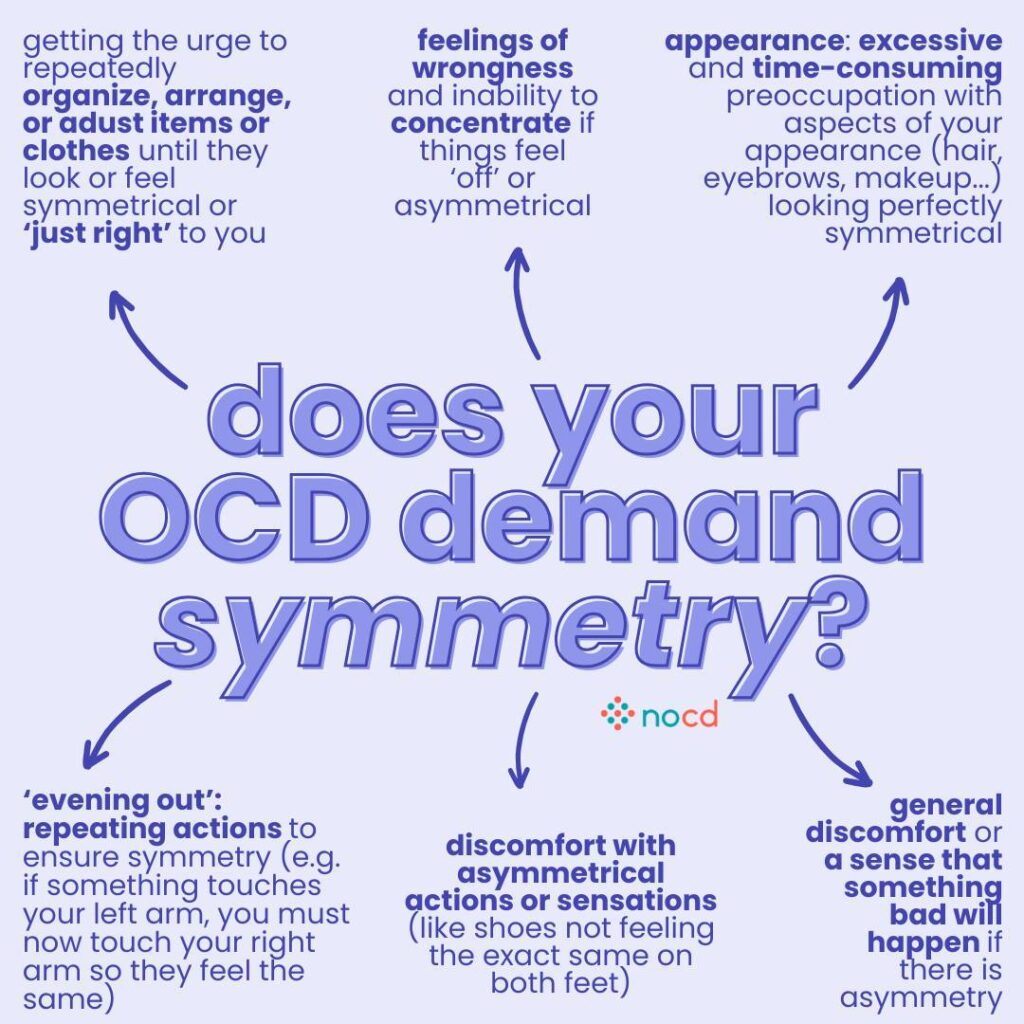Just right OCD, also called perfectionism OCD, is a subtype of obsessive-compulsive disorder (OCD) where the main obsession isn’t about harm or contamination—but about the unbearable feeling that something is off, incomplete, or “not quite right.” Even if there’s no actual danger, people with this subtype feel intense internal discomfort unless things are symmetrical, aligned, or done “just right.”
In one survey, 48% of people with OCD reported experiencing perfectionism-driven OCD themes. These experiences—called Not-Just-Right Experiences (NJREs)—are among the most common symptoms.
In this article, we’ll explore the signs and symptoms of just right OCD, its potential causes, how it’s different from obsessive-compulsive personality disorder (OCPD), and which treatments can put you on the path to recovery.
What is just right OCD?
Just right OCD, also known as perfectionism OCD or symmetry OCD, involves obsessions and compulsions centered around internal sensations or wrongness. These sensations lead to repetitive behaviors aimed at making things feel “complete,” even when there’s no need to do so.
Three core components
Below are the three main components of just right OCD:
- The sensation: An uncomfortable feeling that something is off, incomplete, or misaligned.
- The obsession: A mental fixation on correcting or resolving that feeling.
- The compulsion: The physical or mental act performed to relieve the discomfort, like retyping a sentence or tapping a surface repeatedly.
“It’s common for people to see their symptoms of perfectionism OCD as a part of their personality, or ‘just the way it is,’” says Nicholas Farrell, PhD, LP, NOCD’s Director of Clinical Development & Programming. “In reality, these symptoms can demand a tremendous amount of mental energy and cause you to lose hours of your day to compulsions.”
Unlike other OCD subtypes, just right OCD is less about fear of consequences and more about restoring a sense of internal balance.

What are not-just-right experiences (NJREs)?
NJREs are intense internal sensations of discomfort or wrongness. They’re not rooted in fear of harm but in an overwhelming urge to correct, balance, or align something until it feels “right.”
Examples of NJREs:
- Feeling like a sentence must be re-read until it feels complete
- Needing to walk through a doorway multiple times
- Touching objects evenly on both sides
- Rearranging items until they look symmetrical
These sensations are real and distressing, often leading to compulsions that consume hours of a person’s day.
Just right (perfectionism) OCD obsessions
Here are some examples of thoughts someone with perfectionism OCD might struggle with:
- If I don’t fix this picture frame, something bad will happen.
- The pillows don’t look just right, and I can’t handle that—I must fix them.
- When I do my hair, it has to be perfectly even.
- I need to make sure this text message is phrased just right and gets my message across perfectly. Otherwise, this person will judge me.
- Every time I walk outside, I have to make sure I’m stepping on an even number of sidewalk cracks.
What compulsions are common in just right OCD?
When something doesn’t feel “right,” people with just right OCD engage in compulsions to relieve the discomfort. However, these compulsions aren’t about achieving an external goal—they’re about temporarily easing anxiety that comes from things feeling incomplete, uneven, or imperfect.
Below are a few examples of compulsions seen in just right OCD:
- Repeating actions until they feel “right” (e.g., turning a light switch on/off)
- Rewriting or re-editing text repeatedly
- Reordering objects for symmetry or alignment
- Tapping, blinking, or moving a certain number of times
- Mentally replaying an interaction until it feels complete
These behaviors provide short-term relief, but ultimately reinforce the OCD cycle, making it stronger over time.
What’s the difference between just right OCD and OCPD?
Some people confuse just right OCD with obsessive-compulsive personality disorder (OCPD), as they both involve perfectionism to a degree. However, they are entirely separate conditions that require different treatments.
Here’s a breakdown of just right OCD versus OCPD:
| Just right OCD | OCPD |
| Obsessive-compulsive and related disorder | Personality disorder |
| Driven by discomfort or distress | Driven by values or standards |
| Thoughts and behaviors feel intrusive and unwanted | Perfectionism is seen as necessary or helpful |
| Seeks relief from compulsions | May not see behavior as problematic |
In short, people with OCD want to stop their rituals, while people with OCPD may not even see a problem.
What causes just right OCD?
Mental health professionals and researchers don’t know the exact cause of just right OCD, but there are several potential risk factors to take note of:
- Genetics: Family history of OCD or anxiety disorders
- Neurological differences: Brain scans show altered activity in regions linked to error detection and sensory processing
- Personality traits: High sensitivity, perfectionism, or rigidity
- Environmental factors: Experiences that emphasized control, performance, or order in childhood
Some people also experience sensory phenomena—where compulsions are driven more by physical tension or urges than by cognitive fears.
How is just right OCD treated?
The most effective treatment for just right OCD—and all subtypes—is exposure and response prevention (ERP) therapy. ERP is a specialized form of cognitive behavioral therapy (CBT) proven to be effective for OCD. General CBT, if not tailored for OCD, can sometimes be unhelpful or even worsen symptoms.
Research shows that ERP therapy is effective for 80% of people with OCD.
ERP helps people face the uncomfortable sensation (exposure) without engaging in compulsive behaviors (response prevention).
Here are some examples of what ERP might look like for just right OCD:
- Writing a sentence and sending it without editing
- Intentionally misaligning items and resisting the urge to fix them
- Listening to a song from the middle and sitting with the discomfort
Over time, the brain learns that discomfort fades and compulsions are no longer necessary.
Find the right OCD therapist for you
All our therapists are licensed and trained in exposure and response prevention therapy (ERP), the gold standard treatment for OCD.
Additional treatments
Other treatments that can support ERP therapy include:
People with severe, treatment-resistant just right OCD may benefit from the following treatment:
- Intensive outpatient programs (IOPs)
- Partial hospital programs (PHPs)
- Residential treatment centers (RTCs)
- Transcranial magnetic stimulation (TMS)
- Deep brain stimulation (DBS)
- Gamma knife radiosurgery (GKRS)
When to seek help
If your day is disrupted by rituals, perfectionistic standards, or overwhelming discomfort about things not feeling “just right,” it may be time to seek professional help. OCD doesn’t go away on its own, but it is highly treatable.
FAQs about just right OCD
Is just right OCD the same as perfectionism?
Not exactly. While both involve high standards, just right OCD is driven by internal distress—not a desire to achieve.
What’s the best therapy for just right OCD?
ERP therapy is the most effective treatment for just right OCD. It targets the OCD cycle directly and helps retrain the brain to tolerate discomfort.
Bottom line
Just right OCD can feel exhausting, frustrating, and even isolating. It’s not just about liking things a certain way—it’s about feeling trapped by the need to make things feel right, even when you don’t want to. The good news is that perfectionism OCD is manageable, and you don’t have to stay stuck in these patterns forever.
Key takeaways
- Just right OCD and perfectionism OCD are the same, but perfectionism alone is not OCD. While some people identify as perfectionists, they typically find their high standards rewarding—whereas OCD causes distress and a sense of being trapped in compulsions.
- Common compulsions include fixing, avoidance, and reassurance-seeking. These behaviors temporarily ease discomfort but ultimately reinforce OCD patterns.
- Exposure and response prevention (ERP) therapy is an effective treatment for OCD. ERP helps people gradually face discomfort without engaging in compulsions, leading to long-term relief.

